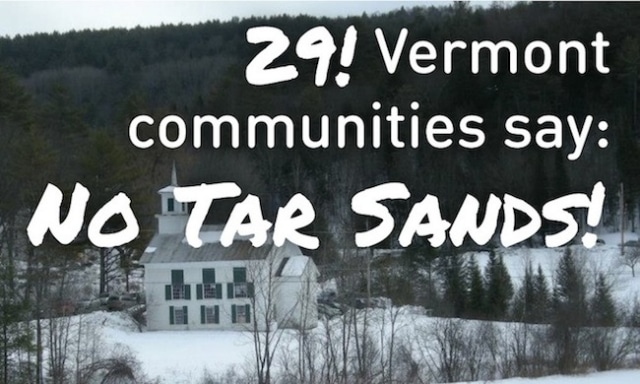Last week in the state of Vermont, 29 communities sent a strong message to elected leaders in Montpelier and Washington, D.C. by passing a non-binding resolution that would prohibit the shipping of dirty tar sands through the Northeast Kingdom portion of the state via The Portland Pipeline.
The 236-mile-long Portland pipeline, which runs from Portland, Maine to Montréal, Québec, across a rather scenic and “wild” portion of northern New England, is said to be majority-owned, at 76%, by ExxonMobil according to an analysis by environmental groups and 350.org.
ExxonMobil, being deeply entrenched in the development of tar sands, might find good reason to send the tar sands from Montréal down to Portland for export, say many environmental groups. Such realities are what propelled Vermont to take precautions and pass the resolution.
Though the Portland Pipeline Corporation (PPC) is on record saying the company has no “active plans” to ship tar sands across northern New England, a few key details pieced together point towards another attempt at misinformation on a critical climate issue.
Recently, the environment minister of Alberta stopped by the Vermont statehouse to talk about the benefits of tar sands.
It would seem to be a rather unproductive chat if there were no “active plans” or possibility of the tar sands moving through the state, as the PPC had previously stated.
Additionally, the town meetings in Vermont, where many officials wrote to several of Vermont’s selectboards to reiterate the safety of the tar sands and pipeline technology, drew the attention of the Canadian consul’s office, according to Vermont Public Radio.
Andy Smith, an organizer with 350VT.org, believes the Canadian officials would not be down here [in Vermont] unless they were worried about the growing opposition to tar sands development.
No plans to ship the tar sands… Then what’s all of the fuss?
Vermont’s democratic muscle has been flexed. And it is not alone.
As 350.org points out, the total number of New England towns opposed to the tar sands currently stands at 33, and 49 when including similar resolutions in Québec.
“History has shown that social movements that begin in New England can go on to sweep the country. These resolutions show that local communities are growing impatient with federal sluggishness to meet the climate crisis and are ready to push forward on their own.”
Here are the towns in the US that have passed resolutions:
VERMONT
* Bennington
* Burlington
* Cabot
* Calais
* Charlotte
* Chittenden
* Cornwall
* Craftsbury
* East Montpelier
* Fayston
* Grand Isle
* Greensboro
* Hinesburg
* Marshfield
* Middlebury
* Middlesex
* Montgomery
* Montpelier (VT capital)
* Moretown
* Plainfield
* Putney
* Randolph
* Ripton
* Starksboro
* Waitsfield
* Walden
* Warren
* Woodbury
* Worcester
MAINE
* Casco
* Bethel
* Waterford
Image credit: 350.org
Subscribe to our newsletter
Stay up to date with DeSmog news and alerts







